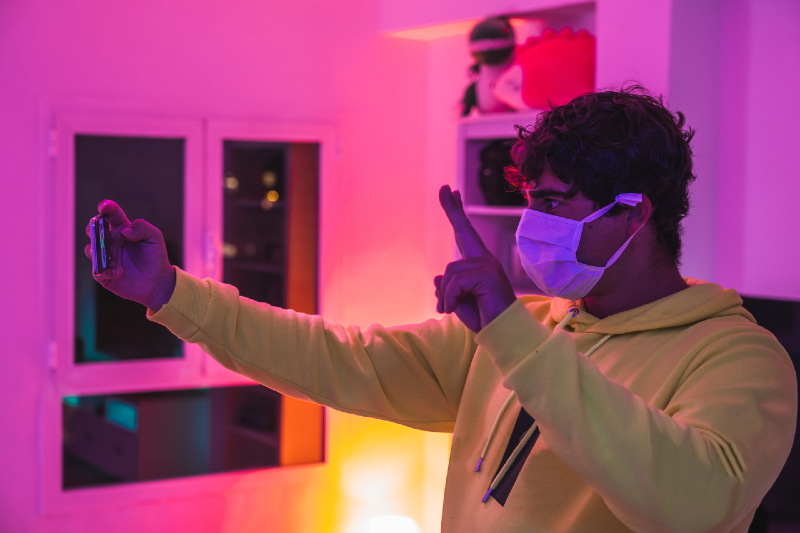In November 2019, the first cases of a new disease soon to make headlines all over the word were reported in China. The virus causing this disease spread and what was from then called COVID-19 was declared a pandemic by the World Health Organisation on 11 March, 2020.
From that moment on, people in most countries of the world faced confinement measures aiming to slow down the spread of the virus in order to ensure access to medical support to all those who needed it. Nevertheless, a year after the beginning of the pandemic, COVID-19 has claimed the lives of at least 2.6 million people around the globe.
The confinement measures – such as limitations on freedom of movement, stay-at-home measures, and the closure of public spaces – have affected all of us. However, people who were already facing discriminations and difficulties, such as LGBTQI+ people, have found themselves hit harder by the pandemic.
LGBTQI+ people and COVID-19
People from the LGBTQI+ community already experience a higher feeling of loneliness and exclusion. The confinement and social distancing measures have exacerbated this – many LGBTQI+ people have lost their links to the community and their supportive social connections and environments.
Due to the measures in place, some queer people have found themselves confined in unfriendly situations – for example, with homophobic or transphobic family members or abusive partners, making their situation harder to bear. Also, most of the LGBTQI+ associations that usually provide support, and that help queer people develop social connections, have reduced their services and have been unable to fulfil that role.
Because queer people are already more vulnerable to health issues, the last year has been particularly difficult for some of them. On the one hand, because LGBTQI+ people have less social protection than the general population, they had less access to treatments and medical attention if they acquired COVID-19. On the other hand, the restrictions made it harder to get access to medication and treatments for people living with HIV, provided less opportunity to get tested and treated for STIs, but also restricted access to medical treatments and surgery for trans people. Finally, the LGBTQI+ community is particularly affected by mental health issues – access to psychological support was also reduced and limited during the last year.
Moving from individual situations to the situation of the LGBTQI+ community as a whole, the past year has seen the cancelation of the social events that usually help strengthen and breathe life into our community. More than 220 Pride festivals and parades – as well as countless parties – were cancelled all around the world. Exhibitions, film festivals and other cultural events that help us showcase who we are to the world were postponed. Sports events for the community – such as the Eurogames that would have taken place in our neighbour city of Düsseldorf – were called off.
Permanent queer spaces have also suffered from the pandemic’s restrictions. The LGBTQI+ associations which form the fabric of queer communities have been seriously weakened by the lack of revenues that are necessary for them to pursue their missions – missions that they have also not been able to carry out properly. Moreover, the queer bars and nightlife spaces that were already in a difficult situation in some places – like Brussels – are now at a high risk of not reopening once the COVID-19 crisis is over. All these spaces are nevertheless essential for our community. Even if some were able to maintain some online presence – like Cabaret Mademoiselle, for example – strong support from all LGBTQI+ people will be needed as soon as these venues reopen to make sure they do not disappear.
Blaming LGBTQI+ people for COVID-19
On top of difficult situations, queer people were also confronted with all sorts of unacceptable accusations. Throughout history, pandemics have often been blamed on LGBTQI+ people and used to increase repression against queer people – often because of an incorrect interpretation of the biblical story of Sodom.
As early as the 6th century, Roman emperor Justinian blamed men having sexual relations with men for a series of plague outbreaks. This led to strong repression against those men, which the emperor used to increase his power and revenues. In the 1340s, Italian cities adopted strong repression measures and launched witch-hunts against men having sexual intercourse with other men after the Black Death pandemic killed more than half of their population.
We may think that these behaviours belong to the past. Yet, the COVID-19 pandemic offered a new opportunity in some countries to persecute LGBTQI+ people in the same way. The pandemic was blamed on gay people in countries like Turkey and Ukraine. It was used as an excuse to harass and detain queer people in Uganda. It allowed the Hungarian president to seize special powers that he then used first and foremost to persecute trans people, making it impossible for them the change their name and the gender on their ID documents. The outbreak of cases in a gay club in Seoul brought stigma on gay people in a country where tolerance is already limited. Also, in the last months, we have heard a religious leader claiming that the vaccine for COVID-19 would turn people gay.
These attacks against LGBTQI+ people are inacceptable and based on outdated beliefs. Yet, queer people have not always led by example in this pandemic. The parties at Puerto Vallarta – where a boat overcrowded with gay men sank while the crisis was at its peak in Mexico – fulled a polemic about how people from the LGBTQI+ community behaved. The instagram account GaysOverCovid led the charge against members of the community that were accused of not caring about others and fuelling the beliefs that LGBTQI+ people were to be blamed for the spread of the virus.
This pandemic revealed not only how LGBTQI+ people could be more vulnerable when faced with such a health crisis, it also revealed how our community was at risk of being weakened by this type of crisis, and also how old beliefs about LGBTQI+ people could easily be reactivated – despite all the progress made in recent decades for the inclusion and recognition of LGBTQI+ people.
The COVID-19 crisis shows us the weaknesses that are still threatening our position in society and how much work is left for us in the future to make sure that queer people are fully integrated and fully protected.
Listen to KET Talks Podcasts now on Spotify, YouTube, IGTV, Deezer and Apple Podcasts!
Enjoy this third episode of the Brussels queer podcast and feel free to give us your feedback on Facebook and Instagram.
You may also like
-

Laetitia BICA : If there’s nothing at stake, why play?
Driven by her Sicilian roots and passion for photography, Laetitia BICA challenges industry norms through
-

LGA-Europe’s Equality Fundraiser Gala in Brussels
On July 4th, ILGA-Europe hosted their Equality Fundraiser 2024 in the Brussels Region, drawing around
-

Guggenheim Bilbao: A Beacon Of Inclusion With Queer Destinations Certification
The Guggenheim Museum Bilbao is breaking new ground as the first international museum to receive
-

Grindr Used to Trick Gay Men in Western Brussels
A Surge of Homophobic Ambushes Source: Le Soir In the latter half of June, western
-

A Celebration of Courage: Chille Deman Receives Citizen Medal from the City of Brussels
In a heartwarming ceremony held on May 17th, the International Day Against Homophobia, the City
